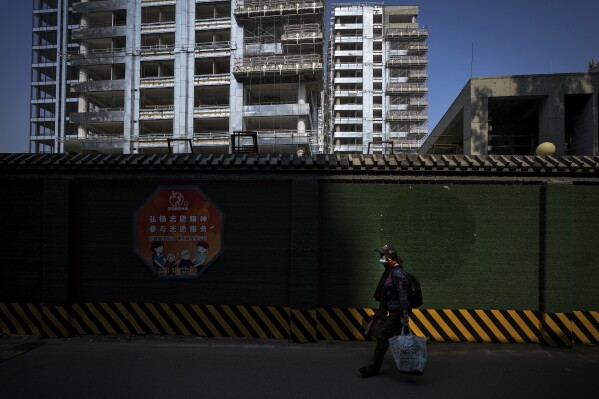China’s economy weakened further in recent weeks, according to surveys released Monday, signaling the need for more support as the government ratchets up stimulus.
The Caixin purchasing managers survey showed new manufacturing orders fell at the fastest pace in two years in September.
“Operating conditions in China’s manufacturing sector deteriorated in September after improving during August,” the report said. “Furthermore, firms lowered their hiring and purchasing activity.”
An official survey released by the National Bureau of Statistics showed a less drastic decline but it marked a fifth straight month of contraction. The purchasing managers index was at 49.8 in September, up from a six-month low of 49.1 in August. The index is on a scale where figures above 50 indicate expansion.
The survey showed that factory output rose while new orders fell.
Chinese stock markets surged Monday, reflecting enthusiasm over a barrage of policy measures announced last week, including lower interest rates and smaller down payment requirements for mortgages and a cut in required bank reserves.
“There is no doubt that the coordinated and emphatic policy stimulus measures announced by Beijing have justifiably invoked optimism,” Tan Boon Heng of Mizuho Bank in Singapore said in a commentary.
The main index smaller market in Shenzhen soared 8.2% while the Shanghai Composite index jumped 5.7%
“The stimulus package announced last week should help shore activity over the coming months,” Gabriel Ng of Capital Economics said in a report. But he noted that imbalances between excess supply of many products versus weak demand persist. And trade measures against China, such as higher tariffs on electric vehicles and other goods, also will weigh on the economy.
“In this environment, a meaningful cyclical recovery would require sizeable fiscal stimulus,” he said. “There has yet to be any official announcement on fiscal support, though some media reports suggest that one could come soon.”
Over the weekend, Beijing moved forward with the measures announced last week to support the property industry and revive languishing financial markets. The central bank announced on Sunday that it would direct banks to cut mortgage rates for existing home loans by Oct. 31. Meanwhile, the major southern city of Guangzhou lifted all home purchase restrictions over the weekend, while both Shanghai and Shenzhen revealed plans to ease key buying curbs.
Property developers have struggled after the government cracked down on excessive borrowing for projects several years ago. Housing prices have continued to fall and the government has moved to ensure that developers deliver apartments that were paid for but not yet built.
The downturn in the property sector has rippled throughout the world’s second-largest economy, hitting many other industries that depended on booming housing construction, such as appliance makers and manufacturers of building materials.
It has slowed China’s recovery from the massive disruptions of the COVID-19 pandemic, adding to pressures on Chinese consumers worried over pay cuts, job losses and weaker asset prices.
Based in Bangkok, Kurtenbach is the AP’s business editor for Asia, helping to improve and expand our coverage of regional economies, climate change and the transition toward carbon-free energy. She has been covering economic, social, environmental and political trends in China, Japan and Southeast Asia throughout her career.
